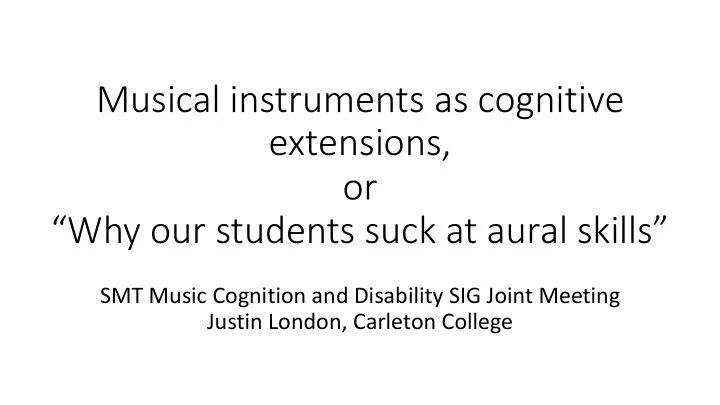

Musical instruments as cognitive extensions, or “Why our students suck at aural skills” SMT Music Cognition and Disability SIG Joint Meeting Justin London, Carleton College
Cognitive Extensions The Blind Man’s Stick The skillful use of a tool actually identifies it to an important extent with our own body . . . The same is true of a probe used for exploring a cavity or a stick by which a blind man feels his way. The impact made by a probe or a stick on our fingers is felt at the tip of the probe or stick, where it hits an object outside, and in this sense the probe or stick is integrated to our fingers that grasp it (p. 604) Michael Polanyi (1962)
Extensions to Both Body and Mind The human organism is linked with an external entity in a two-way interaction, creating a coupled system that can be seen as a cognitive system in its own right. All the components in the system play an active causal role, and they jointly govern behavior in the same sort of way that cognition usually does. If we remove the external component the system’s behavioral competence will drop, just as it would if we removed part of its brain. (p. 7) Clark & Chalmers (1998)
Musical Instruments are Cognitive Extensions From the action-oriented perspective, much of the control and discrimination that characterised experienced musicians’ perception and imagery of music is actually derived from the different habits of action that the musicians have learned to connect with anticipated musical sound. Therefore, people who have learned different habits of musical action are not likely to ‘hear’ music in the same way. (p. 122) Lotta Ilomäki (2013)
Musically-Embodied Cognition is Old News A far more important aid to music recall seems indisputably to be some form of kinaesthetic recurrence. This may function in two ways: either as a mechanized motor habit sequence, or as the immediate recurrence of those kinaesthetic impulses which have become associated, to given auditory experience . . . The 'memorization' of music . . . seems mainly to consist in the formation of a motor habit sequence, and any reliance on auditory experience alone seems to be so restricted as to be negligible in practice. (p. 301) James Mainwaring (1933)
Knowledge and Skill is Domain-Specific All educationally relevant knowledge acquired during instruction is, and only is, domain-specific. (p. 265) Not only is the amount of domain-specific knowledge held in long-term memory hidden from us, the nature of that knowledge tends to be hidden as well. We may know that we have learned Pythagoras' theorem because it was/is explicitly learned. We may not know that we must also learn to recognize the various problem states to which the theorem applies, and that knowledge may be considerably more extensive and difficult to learn than learning the theorem itself (p. 280) André Tricot and John Sweller (2014)
Domain Specific Skills Transfer is Limited Participants either tapped along with the sequence using a drumstick (movement condition) or listened without tapping (no-movement condition). Although both groups performed significantly better when moving than when listening alone, percussionists gained a greater benefit from tapping. . . . Surprisingly, percussionists and non- percussionists performed no differently when listening alone. . . . This raises interesting questions about the degree to which percussionists’ known expertise in timing may interact with their use of motion when judging rhythmic precision. Fiona Manning and Michael Schutz (2013)
How We Get it Wrong • We believe musical knowledge is Domain General. • It Isn’t. • We believe that Domain Specific musical knowledge will transfer from one domain to another • It Doesn’t. • We ignore the fact that a musician’s musical though and action is bound up with their instruments. • A musician’s instrument is part of their musical mind.
Taking Away the Blind Man’s Stick • Taking away students’ instruments is a fundamentally disabling pedagogy • This is akin to taking away the blind man’s stick. • And then we tell our students they can’t see, because they stumble in the new-found dark.
Thank you for your kind attention
Musical Instruments are Cognitive Extensions They are extensions of the musician’s body and the musician’s mind. According to the enactive view, the skill acquisition related to learning an acoustic instrument is highly embodied, non-symbolic and perceptuo-motor based (p. 170). Thor Magnusson (2009)
Works Cited • Polanyi, Michael. (1962). Tacit knowing: Its bearing on some problems of philosophy. Reviews of Modern Physics 34(4): 601-616 • Clark, Andy and Chalmers, David. (1998). The Extended Mind. Analysis , 58(1): 7-19. • Tricot, André and Sweller, John. (2014) Domain-Specific Knowledge and Why Teaching Generic Skills Does Not Work. Educational Psychology Review 26(2): 265-283 • Ilomäki, Lotta (2013) Broadening the notion of aural skills through peer learning, instruments and student-framed assignments: a course with music performance students. In Aural Perspectives On Musical Learning and Practice in Higher Music Education , Inger Elise Reitan, Anne Katrine Bergby, Victoria Cecilie Jakhelln,Gro Shetelig, and Ingunn Fanavoll Øye, Eds. Norges musikkhøgskole og forfatterne, pp. 117-132.
Works Cited • Barret, Karen Chan, Ashley, Richard, Strait, Dana L., and Kraus, Nina . (2013). Art and Science: How Musical Training Shapes the Brain. Frontiers in Psychology, doi: 10.3389/fpsyg.2013.00713. • Palmer, Caroline. (2006). The nature of memory for music performance skills. In Music, Motor Control and the Brain , E. Altenmueller & M. Wiesendanger, Eds. Oxford University Press, pp. 39-53. • Mainwaring, James (1933). Kinaesthetic Factors in the Recall of Musical Experience British Journal of Psychology. General Section 23(3): 284-307. • Magnusson, Thor. (2009). Of epistemic tools: Musical instruments as cognitive extensions. Organised Sound 14(2): 168–176. • Manning, Fiona C., and Schutz, Michael. (2016). Trained to keep a beat: movement-related enhancements to timing perception in percussionists and non- percussionists. Psychological Research 80: 532–542.
Recommend
More recommend